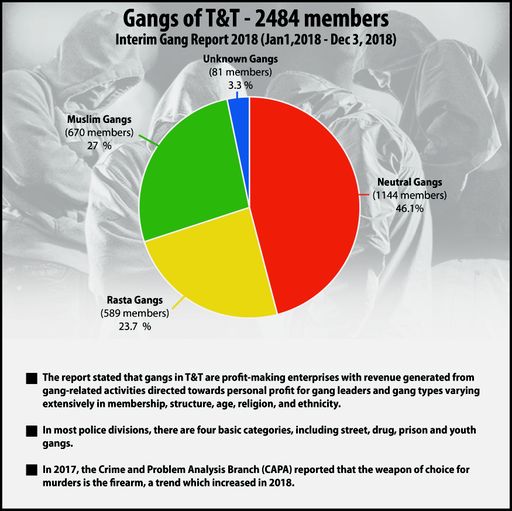(Trinidad Guardian) More than a year after the Anti Gang Act 2018 was proclaimed into law, not a single gangster has been convicted although police have charged several people.
It was a problem laid bare by Commissioner of Police Gary Griffith when he revealed just two weeks ago that “over 50 shooters, linked to various gangs” are responsible for the “significant number of homicides, via gang activity.”
With the homicide count already climbing past the 260-mark for the year, mostly due to an upsurge in gang-related killings, former National Security Minister Carl Alfonso said someone had to rise to the task.
“Somebody has to bell the cat and that somebody has to be the Minister of National Security in collaboration with the Commissioner of Police and the Attorney General to get this thing sorted out,” he said. “It is not an easy task but it has to be done.”

National security stakeholders have laid the blame squarely on the shoulders of law enforcement agencies who they say are stumbling block to the legislation’s success. Politicians, in their opinion, have been cleared as deterrents to the legislation’s effectiveness.
Criminologist Daurius Figueira said: “The legislation can go no further. If it is to go any further, it has to strip us of all our civil rights.”
The most recent gang killing, according to investigators, occurred at Maingot Road, Tunapuna, one week ago when 32-year-old Kevin Figaro was shot dead in his bed at his First Trace home. His murder followed that of 34-year-old Chirvon Brown who was shot and killed one week before.
Describing the current legislation as “very very very harsh,” Figueira added: “The problem is enforcement and a criminal justice system which is in crisis.”
That view was shared by Head of the Criminology Unit, UW, Dr Randy Seepersad.
“What we sometimes have here in Trinidad and Tobago is knee-jerk reactions where we have a law that allows us to do certain things and we may have probable cause for some breach of the law, and then we arrest somebody without thinking down the road about how we are going to translate this arrest into a conviction and this is where the law falls short,” he said.
“The law allows us to do certain things, but without other things that could bring the law to fruition it is just going to fall short and we would not get the benefits of the law. Without that, those laws would not really matter or make a difference.”
Police Commissioner Gary Griffith disagreed.
“The Anti Gang legislation is proving to be very effective in terms of providing a deterrent to gangs,” he claimed.
However, Figueira argued: “The problem is not the legislation but the way you go about building the case.”
Certain type of policing needed
Referring to gang activity as organised crime Figueira pointed out: “The only way you are going to have successful cases is to have a specific type of policing methodology.”
“You have to first penetrate the gang. You have to have people willing to testify. You have to ensure the safety of witnesses and the cases have to be finished quickly. You cannot drag it out for years. It is a problem of policing and a problem in respect of a criminal justice system that has acute constipation.”
Griffith countered: “Imagine if you did not have such an Act. It means that a gang member can actually put out a full-page advertisement inviting people to become gang members.”
He declared that this particular legislation is not as straight-forward when it comes to labelling someone a gang member—as opposed to when someone is held with an illegal weapon.
“It is a lot of evidence that has to be accumulated to ensure the case is air-tight and that is not something that is done overnight,” Griffith said
He added that without anti-gang legislation “gang members could have gone on the streets. They could have assembled. They could have been in specific locations. They could have been doing massive recruitment.”
In policing gangs and their members, Figueira said, time and resources must be devoted to the effort.
“You have to dismantle the operations of the clique by incarcerating the leadership. This is not a quick fix or an overnight thing. This is a lot of hard work and you have to infiltrate the gangs. At the leadership level, the business of the players is not in the streets. Everybody feels that the little young ones walking around with the Glock in their waist are leaders but that is not the leadership as the leaders are very skilled at masking their activity,” he said.
Figueira raised a new concern: “Many people don’t understand there are players in Trinidad and Tobago that are transnational so they don’t stick in a little place and hide there all day. People feel that gangland is these little shooters that everyone sees on the road but that is not gangland. Gangland is defined by the players and if you don’t understand how they operate, you could never arrest gangland.”
He was critical of T&T’s criminal justice system, saying: “We are not building cases that stand scrutiny in the courts of law.”
Figueira explained: “Witnesses are under assault as the maxim of death to informer must be enforced, hence the attacks on witnesses.
The passage of a case through the courts is way too slow which facilitates the assaults on witnesses.
“The prison system at present is not designed to grapple with a remand yard filled with members of gangland awaiting trial for lengthy periods of time, which enables gangland to launch repeated assaults on the remand yard in order to control it. Gangland is now in control of remand and they are running their enterprises from the remand yard.”

“Not a single player of gangland Trinidad and Tobago, from the decade of the 1990s to the present, was ever incarcerated for gang activities,” he said. “Not a single gang from this period to the present was ever dismantled.
“The reality is that the institutions of the criminal justice system need to be rapidly reformed and upgraded to grapple with the 21st-century reality on the ground, as they are at present constituted to face 1960’s reality. This institutional inertia must now end to ensure peace and security for the citizens of Trinidad and Tobago in the 21st century.”





